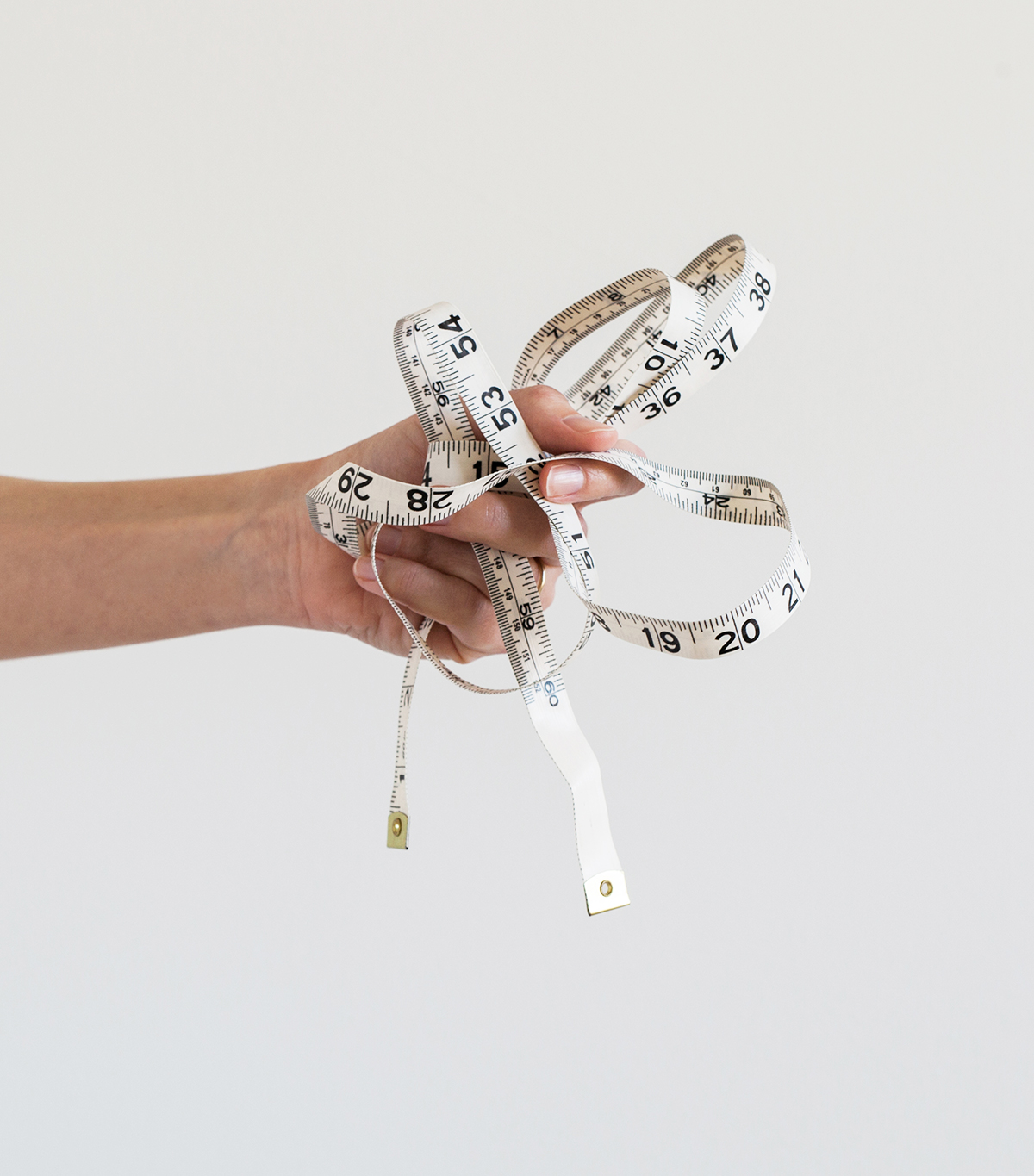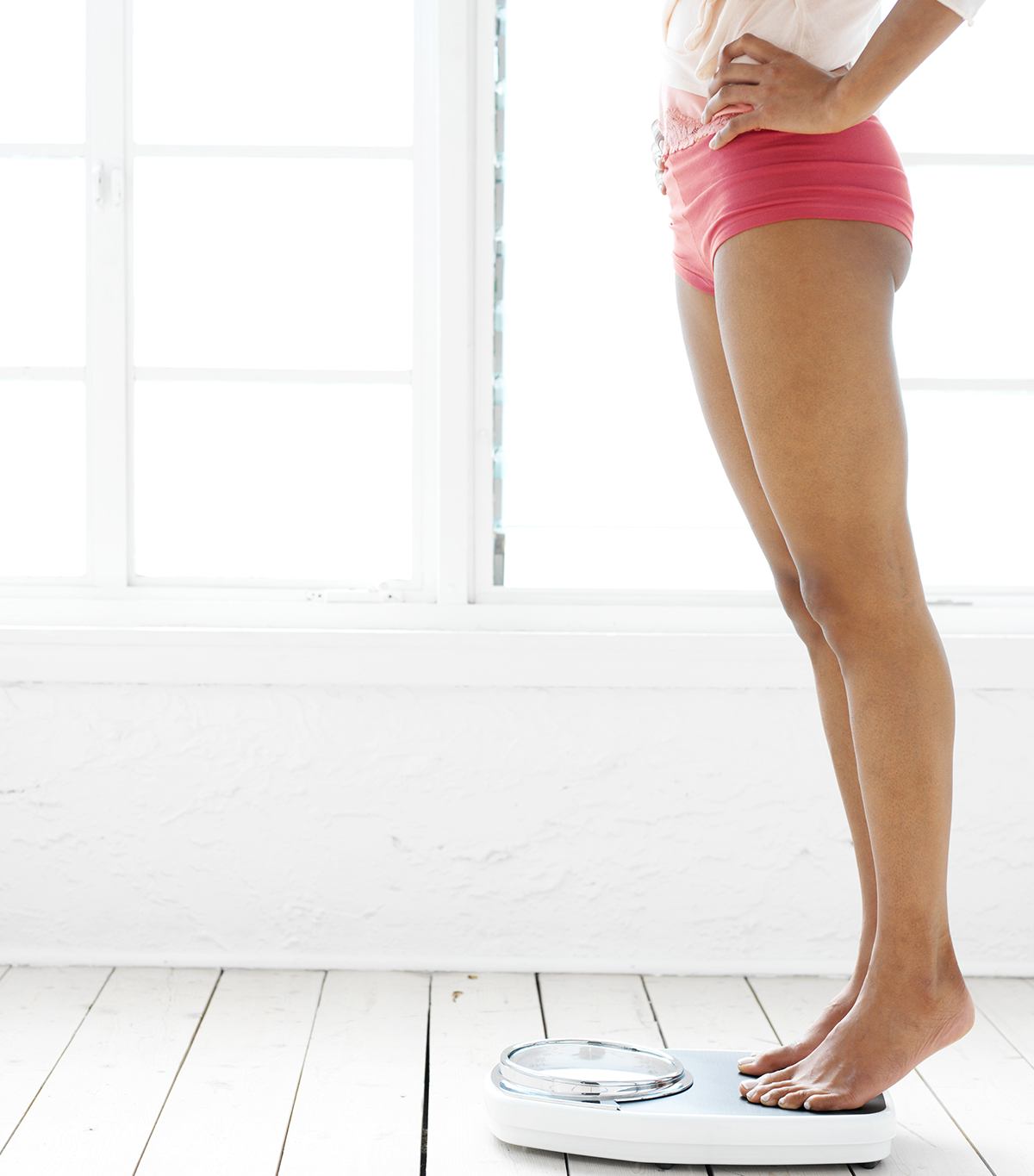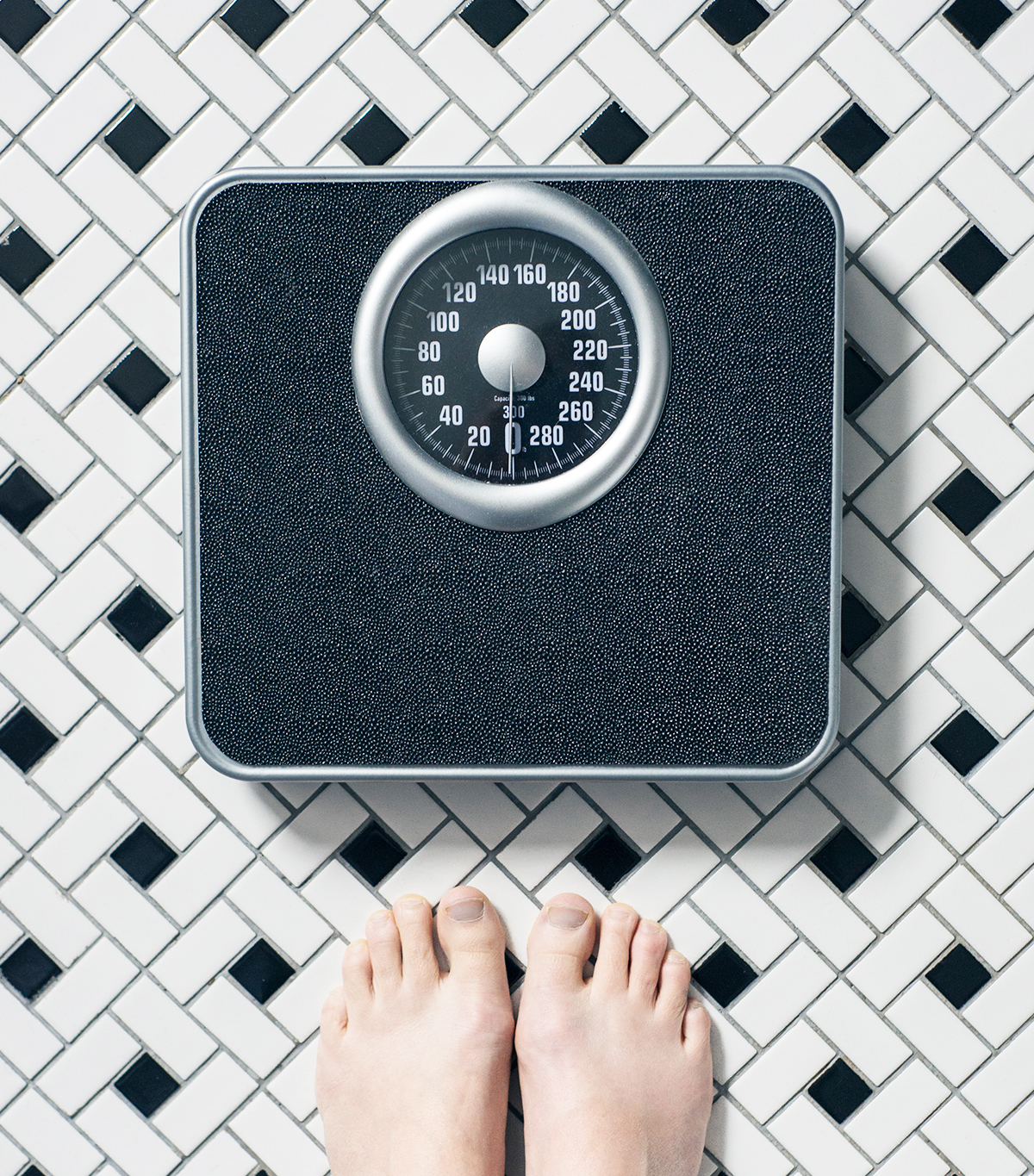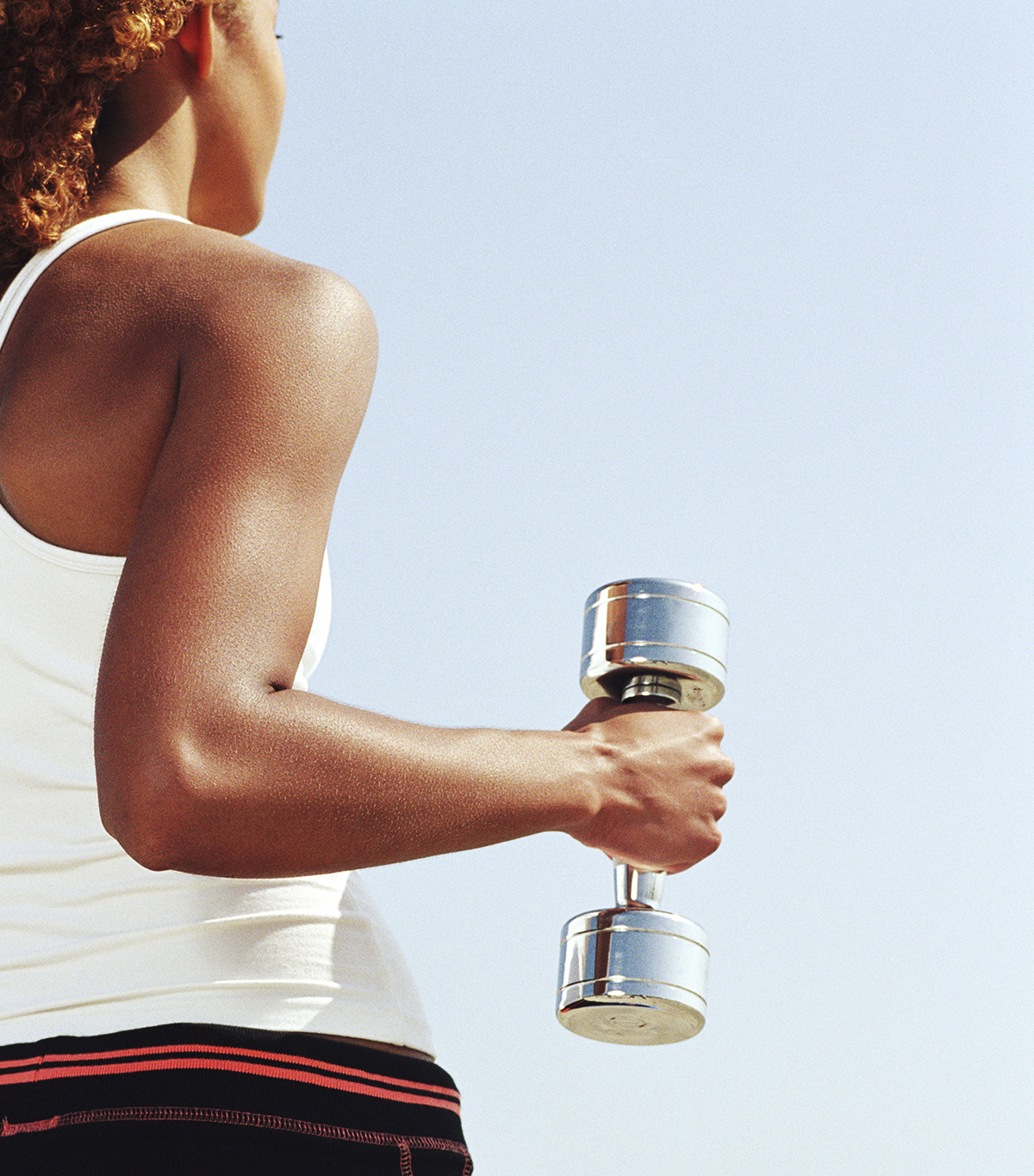5 Empowering Reasons You Should Stop Weighing Yourself Every Day

This is actually the first time I've admitted this: Recently, the scale has had so much control over me. I keep it tucked right underneath my bathroom cabinet and am tempted to step onto it every morning. When I get on the scale, the numbers I see fluctuate by five to 10 pounds month over month. And lately, it's had me down-and-out. I work out on a regular basis and eat a rather balanced diet. I like putting my health first because seeing changes in my body makes me feel good. The fact that what I see on the scale has the power to negatively shift my entire mood is a problem. The fact that I feel the need to weigh myself on a scale every day is problematic, too.
I know I can't be alone in this. A study done by the Journal of Nutrition Education and Behavior says that women who weigh themselves more often are also more likely to be concerned with their own weight, be depressed, and harbor a negative body image (which leads to lower self-esteem). In an effort to break my habit of weighing myself every day and to change the way I think about the scale, I reached out to professionals to seek their sound advice. Claire Fountain, celebrity yoga teacher, personal trainer, and wellness expert, along with Jess Sims, FHITPro trainer at Fhitting Room and certified fitness nutrition specialist, share the reasons you should shift your mindset regarding the scale, how to weigh yourself without one, and every way to take your power back.
Reason #1: There Are More Accurate Ways to Track Improvements Than the Scale

"There are a bunch of other more informative, comprehensive assessments that will help you see the bigger picture," explains Sims. "For example, the InBody assessment takes your gender, height, and age into consideration as it uses a bioelectrical impedance analysis to give you a lot of information about your muscle-to-fat ratio, water weight, body/water composition, segmental analysis of individual parts of the body, and so much more. You can do so much more with this data such as tracking progress in terms of muscle gain and fat loss, finding imbalances in the body. Instead of waiting on one variable to change, there are many other variables in this more comprehensive assessment."
Fountain wants you to be wary of obsessively tracking your weight, but if you must, try measurements. "Have a trainer work with you to take measurements, but as I will always say, check in with how you feel first," says Fountain. "Weight is not the marker we should be looking at. Even for those with weight problems, I would still urge them to build muscle through strength training and a balanced diet. Weight ebbs and flows with hormones—women's weight can fluctuate seven to 10 pounds at different times of the month solely because we have periods, hydration levels, time of day, and so many other factors that are not indicative of total health."
Reason #2: If the Scale Triggers You, Shift Your Mindset With These Questions

"There are layers to weighing oneself," Fountain calls out. "The first being why do we even care to weigh ourselves? The other part is weighing in itself does not have to be upsetting. Think about hopping on a scale and not caring one bit what pops up. That is where I think we should get to. It's not only about 'throwing out a scale' but also about throwing out the negative mindset associated with the scale or weight. Putting our worth into a number from a piece of equipment that might not even be accurate is absurd to me."
Reason #3: Don't Let the Scale Get You Caught Up in Diet Culture

"Diet culture has become so pervasive, it is part of who we are as women and how we navigate the world," Fountain brings up. "Part of that is a preoccupation with body and weight, as we are 'taught' that value lies in physical attributes and only certain bodies, shapes, and weights are valuable. These habits become normalized. It is not uncommon for women to weigh themselves daily and see that as okay. Entire moods can be run or ruined by a number on a scale, which is heartbreaking, as weight can be temperamental at best. It is also not indicative of how else you are doing in life. Are you content? Do you sleep well? Do you have healthy relationships? Do you love easily and often? Do you feel loved and accepted for things that aren't your body? These are more impactful things to be asking."
Reason #4: Understand the Scale Is Not Indicative of Your Self-Worth

This needs to be on a billboard: "Body confidence is not about feeling your body looks good but believing your body is good," says Fountain. "We have associated numbers and weight and scales with our self-worth. We also have put moral labels on something as arbitrary as weight. We always make comments on people's weight without even meaning to, as if slim should be celebrated. It's no surprise people then associate weight with negative things. We are bombarded with images and messages that tell us to care about that. The idea 'fat is bad' has been so deeply embedded in our minds that it takes conscious work to affirm that we are not bad or wrong for choosing to live in other more loving and accepting ways. Though insecurities are human, it's important to question your own beliefs."
Reason #5: For True Health, You Should Look Past the Numbers

"Putting so much emphasis on the scale can be detrimental to your progress, physically and mentally," explains Sims. "Truly ask yourself: Why do I want to get to that goal weight? What would that mean for me? If you find that your answers are something like I felt I looked my best at this weight or That was the weight I was before I got pregnant or I weighed X before my wedding so I know I can get back to that weight, then stop. If you don't want to completely ditch the scale, I'd recommend only weighing yourself once a month."
Sims continues: "You will realize that numbers don't define us. It's more about how we feel in and out of our clothes, how we feel about how strong we are, and how lucky we are to have capable bodies that allow us to work out. It's all about perspective—I always say to my clients that we don't have to work out; we get to work out. Our bodies allow us to do what we want, so we have to love and respect our bodies and fuel them well so that they stay healthy. It goes far beyond numbers on the scale."
Fountain echoes this point of view. "We are not a collection of numbers at the end of the day," Fountain reiterates. "We are humans with far more intricate workings than just being bodies." For true health, look past numbers. Nurture and nourish yourself from the inside out with a diet of whole good foods, moving your body, getting fresh air and sunshine, and surrounding yourself with people who are good for your mental health. Try loving yourself more and take a chance on being nice to you."
It takes time to understand that numbers don't define my progress or where I'm at in my journey to a healthier me. Working on this article has been therapeutic in itself when it comes to how I love my body. I'm taking baby steps, though, and re-evaluating my goals. Join me.
This article is provided for informational purposes only and is not intended to be used in the place of advice of your physician or other medical professionals. You should always consult with your doctor or healthcare provider first with any health-related questions.
